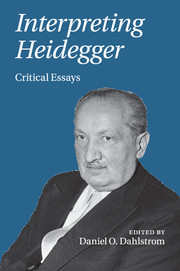Book contents
- Frontmatter
- Contents
- List of contributors
- Acknowledgments
- Method of citation and bibliography of Heidegger's works
- Introduction
- I Interpreting Heidegger's Philosophy
- II INTERPRETING HEIDEGGER'S INTERPRETATIONS
- 6 Being at the beginning: Heidegger's interpretation of Heraclitus
- 7 Being-affected: Heidegger, Aristotle, and the pathology of truth
- 8 Heidegger's interpretation of Kant
- 9 The death of God and the life of being: Heidegger's confrontation with Nietzsche
- 10 Heidegger's poetics of relationality
- III INTERPRETING HEIDEGGER'S CRITICS
- Index
- References
8 - Heidegger's interpretation of Kant
Published online by Cambridge University Press: 11 April 2011
- Frontmatter
- Contents
- List of contributors
- Acknowledgments
- Method of citation and bibliography of Heidegger's works
- Introduction
- I Interpreting Heidegger's Philosophy
- II INTERPRETING HEIDEGGER'S INTERPRETATIONS
- 6 Being at the beginning: Heidegger's interpretation of Heraclitus
- 7 Being-affected: Heidegger, Aristotle, and the pathology of truth
- 8 Heidegger's interpretation of Kant
- 9 The death of God and the life of being: Heidegger's confrontation with Nietzsche
- 10 Heidegger's poetics of relationality
- III INTERPRETING HEIDEGGER'S CRITICS
- Index
- References
Summary
When, a few years ago, I studied the Critique of Pure Reason again and read it against the background of Husserl's phenomenology, it was as if the scales fell from my eyes, and Kant became for me an essential confirmation of the correctness of the way I was seeking. (GA 25: 431/PIK 292)
With these words Heidegger closes his 1927/28 lecture course on Kant's Critique of Pure Reason. They reveal a lot about Heidegger's work on Kant. Heidegger experienced in Kant the same philosophical originality and insight that makes Being and Time such an enduringly important book. Indeed, Heidegger implies here that he sees substantial overlap between his own work and Kant's. When Heidegger publishes his interpretation of Kant, commentators condemn this overlap. They claim that Heidegger's interpretation distorts Kant and buries his transcendental philosophy under a mound of Heideggerian views. The aging Heidegger himself feels compelled to issue a retraction in a late preface to his Kant and the Problem of Metaphysics, claiming – with uncharacteristic modesty, and falsely, as it turns out – that he had forced too much of his own thought onto Kant, subjecting the Critique to a reading whose basic terms are foreign to it. This presumption endures, but it is mistaken. Heidegger's Kant-interpretation is important, and it is so deeply intertwined with the existential phenomenology of Being and Time that it is impossible to understand one without the other.
Keywords
- Type
- Chapter
- Information
- Interpreting HeideggerCritical Essays, pp. 174 - 196Publisher: Cambridge University PressPrint publication year: 2011
References
- 2
- Cited by

